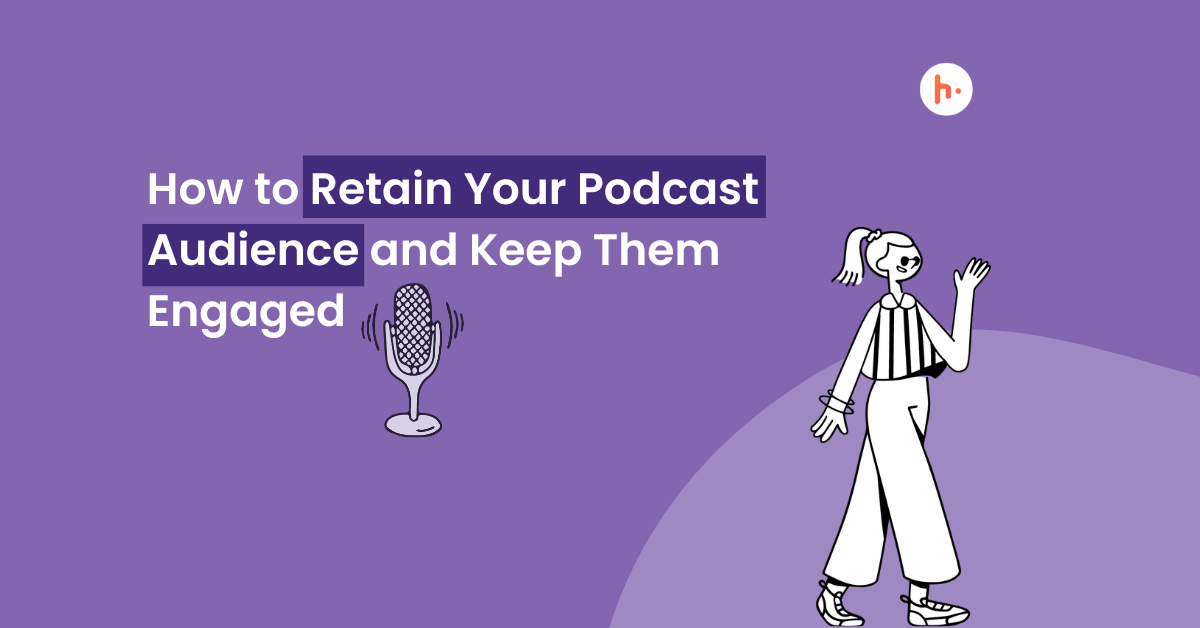When listeners are involved and interested in the podcast, they are more likely to recommend it to their friends and family, which helps the show expand and draw in new listeners.
The longer listeners stay interested in the podcast, the more possibility there is to build a relationship with them, which encourages greater interest in the program and a loyal following.
Therefore, how do you retain your podcast audience? Read along for more best practices to keep in mind.
Retain your podcast audience, it is important
The success of any podcast hinges on its capacity to retain listeners. In the intensely competitive world of podcasting, it is difficult for a podcast to thrive for very long without a dedicated audience. It’s important to retain your podcast audience and keep your listeners’ interest in your message.

Sustained Growth
A loyal audience provides a solid foundation for the growth of your podcast. Instead of just a larger non-repetitive audience, repeat and devoted listeners are more likely to connect with your podcast on a deeper level, actively participating in discussions, sharing episodes with their networks, and providing insightful feedback.
Retain your podcast audience, their devotion fosters a sense of community around your podcast, building a welcoming setting where listeners can interact with you as the presenter and one another.
Valuable Feedback
Engaged listeners typically leave informative comments, which you may utilize to improve the podcast’s content, organization, and user experience. You can also utilize their input to create episodes that are specially catered to your likes and interests.
Monetization Opportunities
A passionate and engaged audience might open up prospects for producing income from sponsorships, advertising, product sales, and crowdfunding. Podcasts that have a loyal and engaged audience are more likely to collaborate with brands and run advertisements.
Audience Insights and Market Research
Listeners who are actively engaged provide useful information about their demographics, interests, and preferences. By connecting with your audience, you might have a better understanding of your target market. This knowledge can help you decide what to include in your podcast, identify your target audience, and attract listeners who share your interests.
Practices to Retain Your Audience

The following are some strategies that you can use to retain your podcast audience and develop a devoted following:
Consistency is Key
Maintain a regular publishing schedule to gain credibility. Whether new episodes are released once a week, twice a week, or once a month, consistency helps your audience anticipate and look forward to them.
High-Quality Content
Make an effort to provide content that will appeal to your target audience. Thorough research, well-prepared subjects, and a gripping narrative are essential for holding listeners’ attention and leaving them wanting more.
Pay close attention to the technical details of the audio production for your podcast. If you can, spend money on high-quality audio recording equipment, editing software, and soundproofing supplies. Make sure your audio is crystal-clear, evenly balanced, and distraction-free.
Engage with Your Audience
Encourage listener involvement on social media platforms, via email, or in niche forums to foster a sense of community and make your listeners feel valued. Moreover, actively reply to suggestions, questions, and comments in order to achieve this.
You can interact with your audience by taking part in a variety of engagement activities, such as using social media or getting involved in the community. Continue reading to learn more about how to put these tactics to use:
Social Media
Establishing social media pages or groups for your podcast where listeners may interact and express opinions is a successful tactic. By keeping them informed about new episodes or exclusive deals, publishing frequently on social media sites like Instagram, Twitter, Facebook, LinkedIn, and YouTube Shorts can also aid in retaining listeners.
Community Engagement
Interacting with your community by holding events like meet-and-greets, live shows, online email campaigns using Mailchimp, and Q&A sessions. You may improve your communication with your audience and retain your podcast audience by building a sense of community and inclusivity.
Soliciting feedback through Polls and Q&A
You can collect feedback from your listeners through polls and Q&As. Additionally, Spotify for Podcasters allows you to add polls and questions to your episode descriptions, which allow the listeners to answer them. This further helps you to gain insights into what can be improved.
Guest Collaborations
In addition to providing fresh perspectives, having guests on your podcast attracts their listeners. By collaborating with subject matter experts, thought leaders, or influencers, you retain your podcast audience too by giving them fresh content. You might also increase the size of your audience and make your podcast available to new listeners.
Challenges Faced by Podcasters and How to Overcome Them

Information Overload
After you start your podcast, additionally, work on getting better in specific areas and reaching smaller audiences. It’s important to concentrate specifically on these aspects for success. Furthermore, maintain the relevance and appeal of your material to your target audience by regularly evaluating it. Moreover, utilize the comments and interactions you get from your current audience as well.
Attention Span
In a time when attention spans are short, it is crucial to make sure that your content is concise, engaging, and well-structured. Keep in mind that determining the ideal length and organization for your podcast’s material is an iterative process. Be open to experimenting and changing over time, and constantly monitor and adapt based on analytics and listener feedback.
Technical Issues
Listeners may become turned off by poor audio quality, irregular volume levels, or other technical issues. Consequently, it is essential to prioritize a seamless and expert listening experience. To achieve this, it is advisable to make smart investments in quality recording equipment, and professional editing software, and to conduct routine quality checks.
Lack of Promotion
It’s not enough to simply produce excellent material; you must also proactively market your podcast. In order to expand your audience and attract new listeners, it is crucial to utilize various promotional strategies. This includes leveraging the power of social media, collaborating with other podcasters, submitting your show to directories, and capitalizing on guest appearances.
Conclusion
Long-term success in the podcasting industry depends on keeping and retaining your listeners. Moreover, a committed listener base not only helps to sustain growth but also makes it possible to take advantage of worthwhile opportunities, such as sponsorships, partnerships, and market research.
To achieve this, you need to establish a strong rapport with your listeners by being consistent in your efforts, creating high-quality content that resonates with them, actively connecting with them through various channels, and paying close attention to their preferences and feedback.
Follow us on Instagram and YouTube to get updates and information about
Happy Podcasting!




